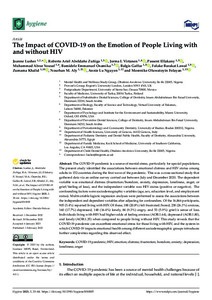The Impact of COVID-19 on the Emotion of People Living with and without HIV
Lusher Joanne; Abeldaño Zuñiga Roberto Ariel; Virtanen Jorma I; Ellakany Passent; Yousaf Muhammad Abrar; Osamika Bamidele Emmanuel; Gaffar Balgis; Lawal Folake Barakat; Khalid Zumama; Aly Nourhan M; Nguyen Annie Lu; Folayan Morenike Oluwatoyin
https://urn.fi/URN:NBN:fi-fe2023020225515
Tiivistelmä
The COVID-19 pandemic is a source of mental stress, particularly for special populations. The present study identified the associations between emotional distress and HIV status among adults in 152 countries during the first wave of the pandemic. This was a cross-sectional study that gathered data via an online survey carried out between July and December 2020. The dependent variable was emotional distress (frustration/boredom, anxiety, depression, loneliness, anger, or grief/feeling of loss), and the independent variable was HIV status (positive or negative). The confounding factors were sociodemographic variables (age, sex, education level, and employment status). Multivariable logistic regression analyses were performed to assess the associations between the independent and dependent variables after adjusting for confounders. Of the 16,866 participants, 905 (5.4%) reported living with HIV. Of these, 188 (20.8%) felt frustrated/bored, 238 (26.3%) anxious, 160 (17.7%) depressed, 148 (16.4%) lonely, 84 (9.3%) angry, and 53 (5.9%) grief/a sense of loss. Individuals living with HIV had higher odds of feeling anxious (AOR:1.64), depressed (AOR:1.80), and lonely (AOR:1.35) when compared to people living without HIV. This study reveals that the COVID-19 pandemic can exacerbate emotional stress for those living with HIV, and the system in which COVID-19 impacts emotional health among different sociodemographic groups introduces further complexities regarding this observed effect.
Kokoelmat
- Rinnakkaistallenteet [29335]
